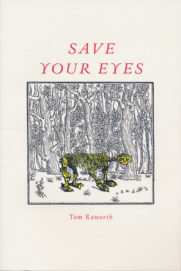 Vicente Huidobro and Hans Arp
Vicente Huidobro and Hans Arp
translated by Tom Raworth
Face Press
by Patrick James Dunagan
Circa 1971, poet Tom Raworth (1938-2017) turned in Save Your Eyes—his translation of the prose collaborations of Vicente Huidobro (1893-1948) and Hans Arp (1886-1966) published as Tres Novelas Ejemplares in 1931—as his Master’s thesis at University of Essex. As Raworth remarks in a December 13, 2016 email to Face Press publisher Ian Heames, “the cross fertilization between what was left of the Dadaist/Surrealist European avant-garde and a few South American minds interested me.” This previously ‘lost’ manuscript was discovered in a cupboard by Philip Terry, whose father Arthur served as Raworth’s examiner. Raworth gave Heames his blessing to publish it shortly before his death.
As the manuscript was found without a title page, and Raworth never had chance to offer up a suggestion, the title Save Your Eyes is taken from the opening story. And although the Spanish title references “three novels,” in reality the work is composed of three collaborative short stories followed by a letter to Arp, along with two additional stories by Huidobro. As Huidobro explains in the letter, “I took our Three Exemplary Novels to a publisher. He found them a little too short for a book, so I have been obliged to write two more by myself.” This is very much in keeping with the Dada-Surrealist humor which runs throughout the collaborative texts.
Profoundly hilarious irony arrives in waves throughout these pages. Take “The Chained Crane (a patriotic, and Alsatian, novel),” in which the absurdity of nationalism and the accompanying hopelessness of war are celebrated in high-mock fashion:
Olives of peace sprouted in men’s hats and women’s stockings. The whole world was happy, and blessed the names of the great chiefs who had led them to war. The golden spur was ground under the heals [sic] of carpetslippers, bedslippers, and houseshoes. Under the light of the moon thousands of unemployed workmen sang happily to the sound of their well-fed guitars. In different countries the newspapers spoke of the delights of the next war, insulting the future enemy who was proclaimed assassin, bandit, vampire, licker of graves, violator of virgin jungles and foetuses, barbarous cave-dweller, Atilla, necrophile, mutilator of Gulf Streams, stealer of volcanoes and pendulums, cowardly sower of drunken fleas, and many other things impossible to note down in passing.
The imagery throughout is consistently vivid. Immersive passages transport the reader into fantastical settings, evocative of paintings by such Surrealists as Leonora Carrington or Remedios Varo, as in “The Gardener of Midnight Castle (a detective story)”:
. . . the mysterious eyes saw the grand piano open and an anchor fall out, burying itself in the depths of the carpet. A siren whistled inside the piano, and immediately afterwards doors were heard banging, and the sound of feet climbing stairs and running along corridors. The mysterious eyes saw the door open and a hundred kangaroos, dressed in the sky-blue uniforms of French soldiers, disappeared into the piano. Was this the glorious army that had fought under the orders of King Dagobert at Poitiers sur Seine? The glorious army descended the piano stairs leading to two mechanical feet which formed the foundations of the Midnight Castle. When the kangaroos reached the toes of these feet—which were as long as Broadway, and filled with bars and luminous cabarets—they began to move.
War and looming post-disaster scenarios are omnipresent in this darkly joyous book; in fact, it perfectly suits the ominous times of our current day, offering up a bit of levity against impending gloom. Raworth’s attraction to these tales is as easy to perceive as his delivery of them into English is clear and concise. On the book’s cover, the woodcut of a Megatherium, an extinct species of giant sloth, cast in yellow against a collaged background of a forest landscape, bears eerie resemblance to the skeleton of polar bear—a nod to climate change? Meanwhile the morphing seashell with spikes growing from it on the back cover has an unsettling, alien-like quality. These images, chosen and designed by the publisher, are well suited to accompany this text into the present moment, when so much in the world feels as precarious as ever.
